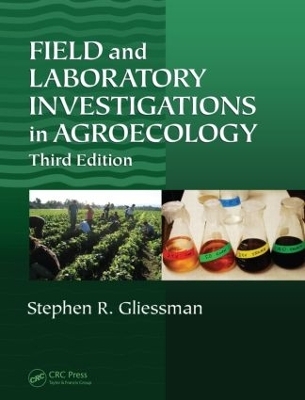
Field and Laboratory Investigations in Agroecology
Crc Press Inc (Verlag)
978-1-4398-9571-9 (ISBN)
Studies of Environmental Factors: These investigations deal with how an individual plant responds to the environment, how environmental factors in specific agroecosystems are measured and characterized, and how particular environmental factors affect individual plants.
Studies of Population Dynamics in Crop Systems: This section studies how populations of organisms act in agroecosystems. It focuses on what populations are present, how they change over time and respond to the environment, and how individuals within a population may interact.
Studies of Interspecific Interactions in Cropping Communities: This section emphasizes the between-species interactions of the organisms that make up crop communities. These interactions include herbivory, allelopathy, and mutualisms.
Studies of Farm and Field Systems: These investigations cover system-level agroecology and whole farms or systems within farm boundaries. They touch on the complexity with which the farmer deals in managing agroecosystems.
Food System Studies: These investigations reach out beyond the individual farm to examine components of the food system at a local level, which impact all of the levels of analysis in the first four parts.
This manual facilitates hands-on learning that involves close observation, creative interpretation, and constant questioning of findings. The investigations emphasize the importance of careful data interpretation and presentation and the value of a clear, concise, and well-written research report. The book uses simple statistical analysis for data management and interpretation and students are guided through the steps of data analysis in the context of the particular investigations in which it is employed.
Stephen R. Gliessman is an agroecologist who integrates science, practice, and social activism. He helped establish agroecology in Mexico in the 1970’s and founded the first academic program in agroecology in the world at UCSC in 1982, where he is now Emeritus Professor of Agroecology. He co-founded the non-profit Community Agroecology Network (CAN). Professor Gliessman has published extensively on agroecology and the transformation of food systems to sustainability, including his textbook Agroecology: Ecology of Sustainable Food Systems. He teaches agroecology seminars and courses around the world and dry-farms sustainable wine grapes and olives with his family at their farm in California.
Studies of Environmental Factors. Effect of Microclimate on Seed. Light Transmission and the Vegetative Canopy. Soil Temperature. Soil Moisture Content. Soil Properties Analysis. Canopy Litterfall Analysis. Mulch System Comparison. Root System Response to Soil Type. Studies of Population Dynamics in Crop Systems. Intraspecific Interactions in a Crop Population. Management History and the Weed Seedbank. Comparison of Arthropod Populations. Census of Soil-Surface Fauna. Studies of Interspecific Interactions in Cropping Communities. Bioassay for Allelopathic Potential. Rhizobium Nodulation in Legumes. Effects of Agroecosystem Diversity on Herbivore Activity. Herbivore Feeding Preferences. Effects of a Weedy Border on Insect Populations. Studies of Farm and Field Systems. Mapping Agroecosystem Biodiversity. Overyielding in an Intercrop System. Grazing Intensity and Net Primary Productivity. Effects of Trees in an Agroecosystem. Food System Studies. On-Farm Energy Use. Farmer Interview. Local Food Market Analysis. Instructor’s Appendix. Appendix A: Planning the Field and Laboratory Course. General Appendices. Appendix B: Measurement Equivalents. Appendix C: Material and Equipment Suppliers.
| Erscheint lt. Verlag | 12.2.2015 |
|---|---|
| Zusatzinfo | 57 Tables, black and white; 59 Illustrations, black and white |
| Verlagsort | Bosa Roca |
| Sprache | englisch |
| Maße | 210 x 280 mm |
| Gewicht | 470 g |
| Themenwelt | Naturwissenschaften ► Biologie ► Botanik |
| Naturwissenschaften ► Biologie ► Ökologie / Naturschutz | |
| Naturwissenschaften ► Geowissenschaften ► Geologie | |
| Weitere Fachgebiete ► Land- / Forstwirtschaft / Fischerei | |
| ISBN-10 | 1-4398-9571-6 / 1439895716 |
| ISBN-13 | 978-1-4398-9571-9 / 9781439895719 |
| Zustand | Neuware |
| Haben Sie eine Frage zum Produkt? |
aus dem Bereich


